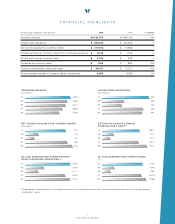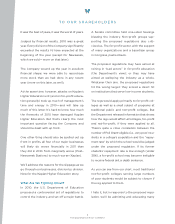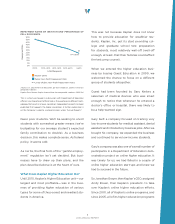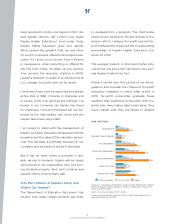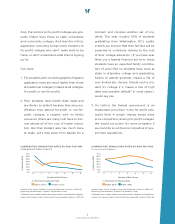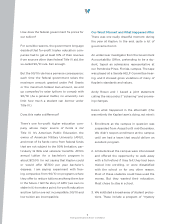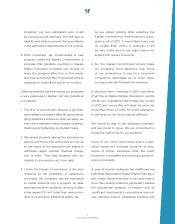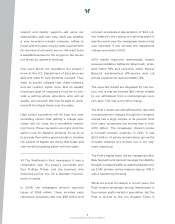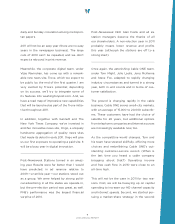Washington Post 2010 Annual Report Download - page 13
Download and view the complete annual report
Please find page 13 of the 2010 Washington Post annual report below. You can navigate through the pages in the report by either clicking on the pages listed below, or by using the keyword search tool below to find specific information within the annual report.
11
2010 ANNUAL REPORT
an S&P 500 company, we continue to have
an overfunded pension plan. We haven’t had
to contribute to the plan in decades. There’s
almost no chance we’ll have to contribute in
the near future.
By accounting rules, the plan generates a pen-
sion credit (last year’s was $4 million), which is
allocated to the divisions based on their histori-
cal contributions and the current service costs.
In recent years, Newsweek had recorded a large
pension credit (now reported at corporate).
The Post, having repeatedly gone through buy-
outs of senior employees, has been recording a
large noncash pension expense in recent years.
Since the expense is noncash, I expect Post
managers to pay no attention to it, and I would
suggest that shareholders do the same (the
same, of course, applies to the large pension
credit at corporate).
Our board underwent enormous change in
2010–2011. First, Melinda Gates left the board.
If only for her knowledge of technology and
education, Melinda was a uniquely excellent
board member. Her awesome work at the
Gates Foundation somehow left her time to
apply herself to Company matters whenever
she was needed. When she told me last spring
she might be leaving the board, I knew there
was no replacing her and was simply grateful
for her six years of service. She is one of the
best-known people in the world, but I join all
her colleagues in saying: Melinda is much more
impressive than the world yet understands.
Another loss is that Warren Buett is leaving
the board after 37 years of once-interrupted
service. (Warren joined the board in 1974; he
left from 1986 to 1996, when he was on the
board of Capital Cities after its purchase of
ABC, though he continued to consult with Kay
Graham and me during those years.)
No important decision at The Post Company
has been taken for all those years without ask-
ing for Warren’s input. What he nudged us into
is easily described: the purchase of what is now
Cable ONE; the Houston and San Antonio TV
acquisitions; our active stock repurchasing; the
selection of our pension advisers.
What he kept us out of was still more impor-
tant: Kay Graham described in Personal
History the advice Warren gave when she
was eager to buy newspapers and TV sta-
tions. She bid, but followed Warren’s ideas
of value and didn’t bid crazy prices. Likewise,
he talked me out of a couple of ill-conceived
acquisition ideas that would have created
serious problems.
Warren is incomparable. For 37 years, we’ve
been privileged to have the single-best adviser
a corporation could have had in those years. He
says he’ll still be willing to advise us as before;
there will be a lot more DC-to-Omaha phone
calls and plane travel coming up.
Donald E. Graham
Chairman of the Board and Chief Executive Ocer
February 23, 2011


